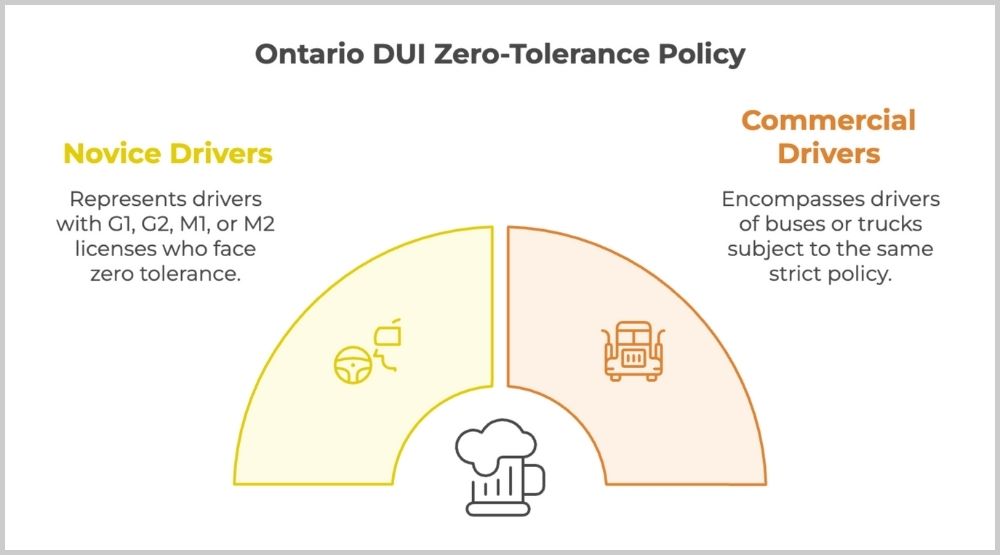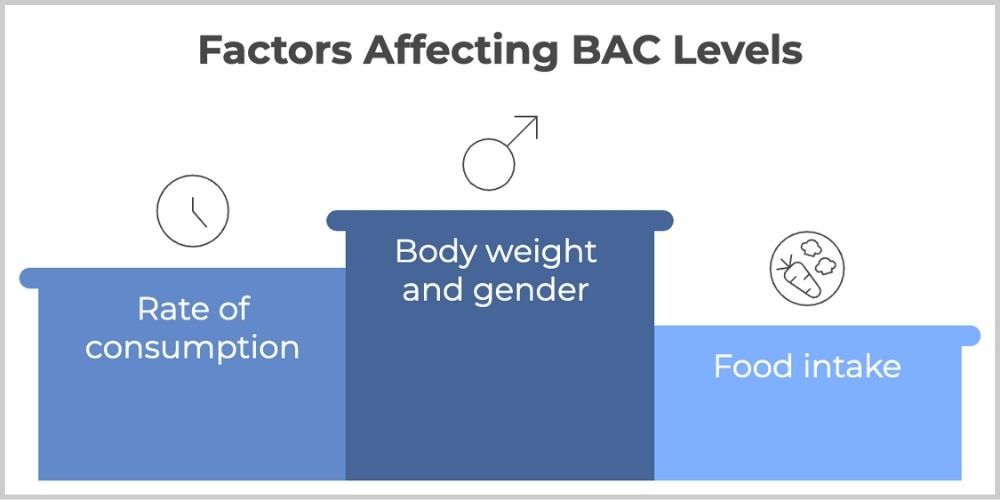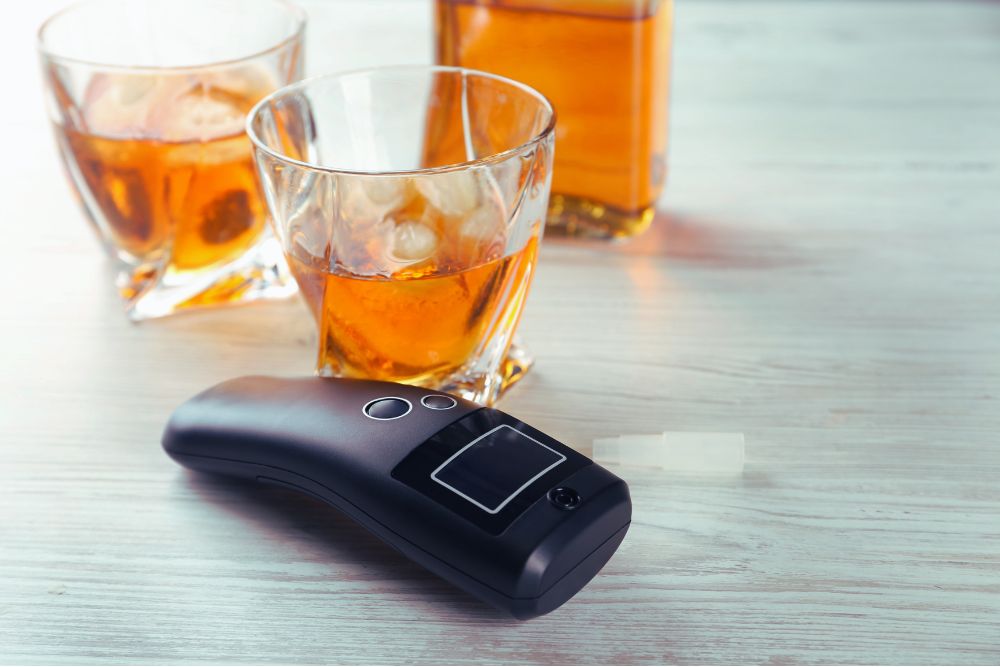Ontario Legal Blood Alcohol Limit
Last Updated: November 20, 2024
The Ontario government enforces strict impaired driving laws to protect people on the roads. These laws apply to impairment due to drugs and alcohol, although alcohol is one of the most commonly used substances. An important aspect of this enforcement is the threshold for your blood alcohol concentration (BAC).
The legal blood alcohol limit in Ontario is 0.08% for a fully licenced driver. You will likely face harsh legal penalties if you are above this limit. These penalties will vary based on your case’s seriousness and whether or not you have been convicted of a DUI before. They can include fines, licence suspension, and even jail time.
Understanding Ontario’s Legal BAC Limits
Under the Criminal Code of Canada, the general legal limit in Ontario for BAC is 0.08% for fully licensed drivers. However, even if your blood alcohol concentration is below this, you could still be facing consequences. You can be charged with provincial offences instead of ones under the Criminal Code. If your BAC is between 0.05-0.079%, you can be charged because you are in the “warn range.” For this, you could be charged a fine, have your license suspended, be required to participate in an education program, or even have an ignition interlock device attached to your car.
In some cases, Ontario DUI laws have a zero-tolerance policy for alcohol impairment. This means that if your BAC is anything over 0%, you could be facing provincial charges. This applies to novice drivers, like individuals with G1, G2, M1, or M2 licences. This also applies to those who have commercial licenses, like those who drive buses or trucks.

If you are caught violating the zero-tolerance policy, you could be charged a fine, have your license suspended, be required to participate in an education program, or even have an ignition interlock device placed in your car. Ontario BAC laws are strict, so you could be charged even if it is your first offence, and you have an otherwise clean record.
Consequences of Exceeding Ontario’s BAC Limits
If you are a fully licensed driver in Ontario and you are facing a DUI charge because your BAC was over 0.08%, your consequences could include an immediate 90-day license suspension and heavy fines that could be over $1000.
If your BAC is over 0.08%, you can be charged under the Criminal Code, which means that you could be dealing with criminal charges. This could lead to you having a permanent criminal record, which can have significant long-term impacts.
If your BAC is in the “warn range” (0.05-0.079%), then you could be subjected to an immediate license suspension for 3 days and a $250 fine if it is your first time. For the second and third offences, your license suspension and fine will both be increased, especially if the offences are within 5 years of one another.
Young and novice drivers must keep their BAC under 0.01%, as anything greater than this could result in a provincial DUI charge. As an inexperienced driver in this category, you could be facing a 30-day license suspension and fines, too. You may also be required to complete remedial programs to educate you on the impacts of impaired driving and the Ontario BAC limits for drivers.

Additional Penalties and Long-Term Consequences
Aside from fees and license suspensions, there are alternate punishments that may apply to you based on the circumstances of your case. Some of the most common ones are:
- Ignition Interlock Program
The ignition interlock program is a mandatory program for those who have been convicted of a DUI under the Criminal Code (meaning their BAC was over 0.08%) or who were suspended more than three times within 10 years for impaired driving, called administrative suspensions.
Participation in this program means that you will have to get an ignition interlock device installed in your vehicle that you will have to blow into every time you want to drive. The device tests your BAC. If it detects alcohol in your system, your vehicle will not start.
If you are convicted under the Criminal Code, you could have the device in your car for 1-6 years, depending on if you are a first, second or third-time offender. If you are facing administrative suspensions, you could have the device for a minimum of 6 months after your license suspension period is over.
You will have to pay for the installation and monitoring of the device yourself, which could be around $100 or more every month. Removal of the device will also cost you over $100.
- Vehicle Impoundment
Whether it is your first, second, or third DUI offence where you BAC over 0.08%, under Ontario provincial law, your vehicle could be impounded for 7 days. You will likely be responsible for towing costs, as well.
- Mandatory Education or Treatment Programs
If you’re convicted of a DUI charge, you may be required to complete certain educational and training programs to get your license back. One of these programs is the “Back on Track” program. This program is designed to help you keep driving and drinking separate from each other. You will likely have to pay for this program yourself, and it costs $894 for drivers convicted of impaired driving.
During the time that you’re taking the program, you will not be permitted to drive, as your license will be suspended. The program has three parts: the assessment, the 8-hour education or the 16-hour treatment workshop, and a follow-up interview after 6 months.
After you complete the program, you have to pay any outstanding fees or penalties against you and wait for your suspension period to end to get your license back.
Factors That Affect BAC Levels

- Body weight and gender
Men are typically larger than women, meaning they have more blood in their systems to dilute alcohol. Thus, a woman would likely have a higher BAC than a man who has consumed an equal amount of alcohol in the same amount of time. The same applies to people of the same genders, where one is physically larger than the other.
- Rate of consumption
The faster you drink, the faster your BAC will rise. If your liver cannot keep up with metabolizing alcohol because you are consuming too much of it, the alcohol will circulate in your bloodstream until your liver can process it.
- Food intake and other factors
When you have food in your stomach, your body absorbs alcohol more slowly. Alternatively, if you’re drinking on an empty stomach, you’re more likely to become intoxicated more quickly, meaning your BAC will rise faster, too.
Other factors that can impact your BAC levels are what kind of alcohol you are consuming, the medications you’re taking and your tolerance levels.

What to do if Charged with Exceeding the BAC Limit
If you are pulled over on suspicion of exceeding the Ontario BAC thresholds, the best thing that you can do at the moment is to cooperate with law enforcement. Blow into the breathalyzer if they ask you to do so, as failing to comply could lead to a criminal charge. Avoid self-incrimination to the best of your ability. This can be done by not talking more than you have to, so it is not the best idea to try and argue your way out of the situation.
You have a right to seek legal counsel – so exercise that right as soon as you can. Contact one of our experienced and knowledgeable impaired driving lawyers today if you have been accused of violating BAC regulations in Ontario.
With the help of a defence lawyer, you will be able to identify possible defences that may be able to get your charges/penalties reduced or even dropped altogether. Some defences may include challenging the accuracy of the BAC detection device. For instance, sometimes, breathalyzer devices are not calibrated correctly, which could cause inaccurate readings. Other defence could include identifying procedural errors made by law enforcement officers during your arrest and investigation. For example, the police may have violated your Charter rights at some point during the investigation, which could mitigate the evidence they have against you.
Impact of BAC Limits on Insurance and Employment
Exceeding the blood alcohol limit in Ontario can have many negative impacts, including on your car insurance. Your insurance provider may drop your policy after finding out you have a DUI. Or they may designate you as a “high-risk driver.” High-risk drivers will usually have much higher premiums than drivers with clean driving records. This can last for months before your record is “cleared.”
Another negative impact is regarding employment. If you are convicted of a DUI, you may get a criminal record that future employers may want to see as a part of the application process. Even if you are not required to disclose a criminal record, you may be required to share a driver’s record, which can reveal license suspensions associated with DUIs. Your ability to get jobs that involve professional driving could be hindered by this greatly.
Conclusion
Going over the Ontario BAC thresholds can have significant negative impacts on your life. Ontario enforced strict BAC limits, meaning you could be in trouble if you’re over 0.08%, or in some cases, even under this. You could be forced to contend with heavy fines, vehicle impoundment, license suspension, requirement to engage in an educational course, and even run the risk of getting a permanent criminal record.
Ultimately, the best way to protect yourself from these complications is to enjoy alcohol responsibly and respect the legal limits. By practising responsible drinking habits, we can protect ourselves and others from being involved in dealing with these kinds of difficult situations.
Get A Free Consultation
"*" indicates required fields



